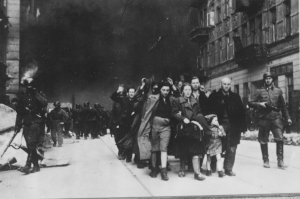Inhabitants of the Warsaw Ghetto being rounded up for deportation by German soldiers, May 16, 1943.
Today is the 75th anniversary of the end of the Warsaw Ghetto Uprising, the largest single revolt by imprisoned Jews against the Nazis during World War II.
Bigots often justify and minimize the domination and suppression of the rights of others by saying “If it was so bad, why didn’t they resist? Why didn’t they fight back?” Many historical revisionists say that enslaved, attacked and subjugated people didn’t really mind being dominated, corralled and abused. But oppressed people often DO fight back, frequently with horrible results. They may give hope and encouragement to others and go down in history as heroes, but they often pay the ultimate price. That is what happened in Warsaw, and ended on this day in 1943.
Vulnerable people can rarely dominate stronger, better armed people who wield political power over them and use it against them ruthlessly. So, naturally, it makes perfect sense to avoid fighting against one’s oppressor when torture, death and retaliation against one’s loved ones are the likeliest responses to resistance. It is reasonable to want to avoid trouble in order to stay alive and hope for a better chance at escape the next day.
However, there have been countless examples of subjugated people fighting with all their might against their oppressors throughout history. Many enslaved and oppressed people have fought (and continue to fight) against those who captured, tortured and enslaved them. Many Jews who suffered at the hands of the Nazis were among those who fought back despite terrible odds and brutal punishment.
During the Holocaust years, many Jews fought back, resisted, risked their lives and used their might and wiles in their fight against the Nazi powers who rounded them up, assaulted them, tortured them, imprisoned them and murdered them. From October 1940 to May 1943, over 400,000 Jews were confined to the Warsaw Ghetto in German-occupied Poland. From there they were deported to Nazi camps and mass-killing centers. During the summer of 1942 alone, over a quarter million residents of the Warsaw Ghetto were sent to the Treblinka extermination camp. By that autumn, it was clear that those deported to Treblinka were being sent to their deaths. The Jews who remained decided to resist further deportations. Some found ways to smuggle in weapons and ammunition.
On April 19, 1943, the Jews of the Ghetto rose up to oppose Nazi Germany’s final effort to transport the remaining Ghetto population to Treblinka. The uprising began when inhabitants refused to surrender to the police commander. He ordered the burning of the Ghetto, block by block, ending on May 16, when the Great Synagogue of Warsaw was destroyed. Over 56,000 people were killed on the spot or deported to concentration and death camps. About half of those who were killed in the Ghetto that day were burned alive or suffocated.
Let us remember them today. Let us never forget.

